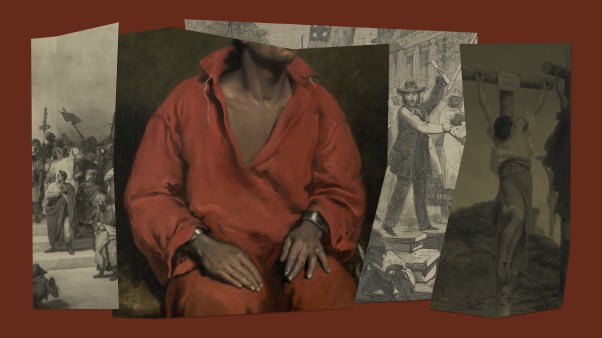In the early part of this presidential election cycle, Republican candidate Michele Bachmann's husband came under scrutiny for his practice of helping those with same-sex orientations attempt to change. The episode proved good for little else than the inevitable litany of jokes and accusations. Mr. Bachmann's practice may be more sophisticated than simply "praying the gay away," as it has been dubbed, but in a cultural context where homosexuality is viewed as "natural," any attempts to "cure" it are simply nonstarters.
Seeking the Straight and Narrow: Weight Loss and Sexual Reorientation in Evangelical America
University of Chicago Press
288 pages
Not long after Bachmann faded, Chris Christie's ongoing flirtation with a run for the presidency raised a half-hearted round of questioning (and another whole-hearted round of jokes) about whether his weight would keep him out of the Oval Office. The question was ultimately moot, as Christie decided not to run. But not before the ladies on The View, who seem to be vying to replace Jerry Springer as ringmasters of the most irritating shouting match on television, managed to get their jabs in. They spent an entire segment yelling at each other (literally) over whether Christie's weight should keep him from the job.
Evangelicals sit in a somewhat paradoxical relationship with these cultural narratives about homosexuality and weight, as Lynne Gerber argues in Seeking the Straight and Narrow: Weight Loss and Sexual Reorientation in Evangelical America. On the one hand, most of the movement resists the prevailing view that homosexuality is not only acceptable but inviolable and inalterable. The past 30 years have seen a steady proliferation of so-called "ex-gay" ministries, the most prominent of which is Exodus International. Such ministries are tasked not only with fulfilling their institutional vocation of helping those with same-sex desires live faithfully but also with defending their legitimacy and distancing themselves from their problematic methods of the past (think shock therapy).
On the other hand, evangelical weight ministries—Gerber focuses on First Watch—are largely able to adopt and reinforce prevailing cultural norms. We may have overweight pastors in our midst, but evangelicals also have a long (well, longish) history of enfolding dieting and weight-loss programs into our parachurch ministries. Gerber jumps off historian Peter Stearns' analysis that "fat became a secular sin" and explores the ways in which that secular sin has been "re-marked in weight loss efforts." While First Watch actively resists the language of "diets" (in favor of a "lifestyle change"), Gerber suggests that the introduction of religious practices like prayer and Bible study to accompany weight-loss efforts is more "window dressing than challenge." And so "evangelicals are able to engage in dominant weight-loss culture by simply giving it a kind of Christian makeover."
Unlike many critics of ex-gay or weight-loss ministries, Gerber spent a considerable amount of time attending meetings and talking to participants of Exodus and First Watch. She is fastidious in her suspension of judgment, spending most of the book reporting and recounting. Seeking the Straight and Narrow is better than a merely sympathetic account: it is fair and charitable. Gerber does her subjects the courtesy of raising her concerns when she has them while not neglecting to present the other side.
The book proceeds by examining how the narratives of sin and health are deployed within each program, and proceeds to examine the way each ministry presents possibilities for change to participants. Perhaps the most interesting section is her final one, where she examines how ministries respond when change does not occur, and the standards they deploy for asking participants to leave. Gerber points out that each program has a "flexible" rhetoric of change that dilutes "success" from entailing transformation to simply meaning staying in the program. Because both programs are oriented toward morality, obedience and ceaseless striving are deployed to legitimate continued attendence, even if change is imperceptible.
Yet Gerber acknowledges in her conclusion that the structure of her narrative reveals her judgment: "My accounts of the people who leave the ministries because they see the impossibility of what they have been pursuing," she writes, "may seem a relief." Yet at just the moment when the wary evangelical would expect a dismissive screed, Gerber hedges: "I find myself resistant to simply drawing the conclusions that the structure of this book infers." Focusing on ex-gay ministries, she contends they often "advance political positions, foster hopes, and compel practices that are misguided and harmful." But she is also willing to "recognize these ministries at their best," and acknowledge that the "ex-gays who are most successful in their project resist the modern privileging of sexual identity over religious identity." Her suggestion that those in ex-gay ministries "are not, in fact, lying to themselves or to others" but "are emphasizing a different aspect of their experience and identity than secular culture would recommend" is as judicious a conclusion as one could hope for, and exemplary of the perspective she takes throughout the work.
For most evangelicals, there won't be much that is new here. Gerber's subjects repeat arguments and phrases that many Christians will be well acquainted with and so not have second thoughts about. But that is precisely the value of Gerber's book for evangelicals: She problematizes evangelical rhetoric, giving it a sense of strangeness that is useful for considering it anew—pointing out, for instance, that the attempt to "decouple feelings of same-sex attraction from gay identity" among ex-gay ministries often makes it seem as though gay identity is "more morally troublesome than same-sex erotic desire." Such a position indicates, if nothing else, just how deeply the language of "identity" has taken root within evangelical discourse about sexuality. At the same time, Gerber's analysis that the optimistic rhetoric of "change" often struggles to include "failure" without ad hoc expansion should make those engaged in those ministries ensure their rhetoric matches the slow, difficult process of change all the way through.
Yet the most important benefit of Gerber's book is that it challenges evangelicals to rethink our relationship to secular practices and modes of discourse by pointing out that such relationships are inescapable. It is indisputable, as far as it goes, that health is a human good. But the discourses of weight loss are a separate matter, and a more pernicious one at that. The lack of a challenge to prevailing notions about weight reinforces the possibility that such movements will be finally more shaped by Shape than by Scripture.
Advocates for Exodus and similar programs likewise are shaped by secular notions of sexuality even in opposing them, and are even more in danger of not seeing how they are so formed precisely because they stand in opposition. They must defend their legitimacy because they hear it questioned incessantly, yet the risk is that the defense will alter the character of the message, such that it is framed on terms inhospitable to the "good news." There may be a lesson for them in Jesus' silence at his trial.
Perhaps the central question for evangelicals is one that Gerber does not raise, but which stands beneath the relationship between evangelicalism and secular practices: Why is discipleship in the matters of weight and same-sex attraction outsourced to parachurch ministries and support-groups, rather than enfolded into the normal life of the church? The question is ultimately a theological one, and so outside Gerber's domain. But Seeking the Straight and Narrow is helpful for discerning the fruits of that divide, and determining whether it has been a healthy one.
Matthew Lee Anderson is the author of Earthen Vessels: Why Our Bodies Matter to Our Faith (Bethany House).
Copyright © 2012 by the author or Christianity Today/Books & Culture magazine. Click here for reprint information on Books & Culture.










